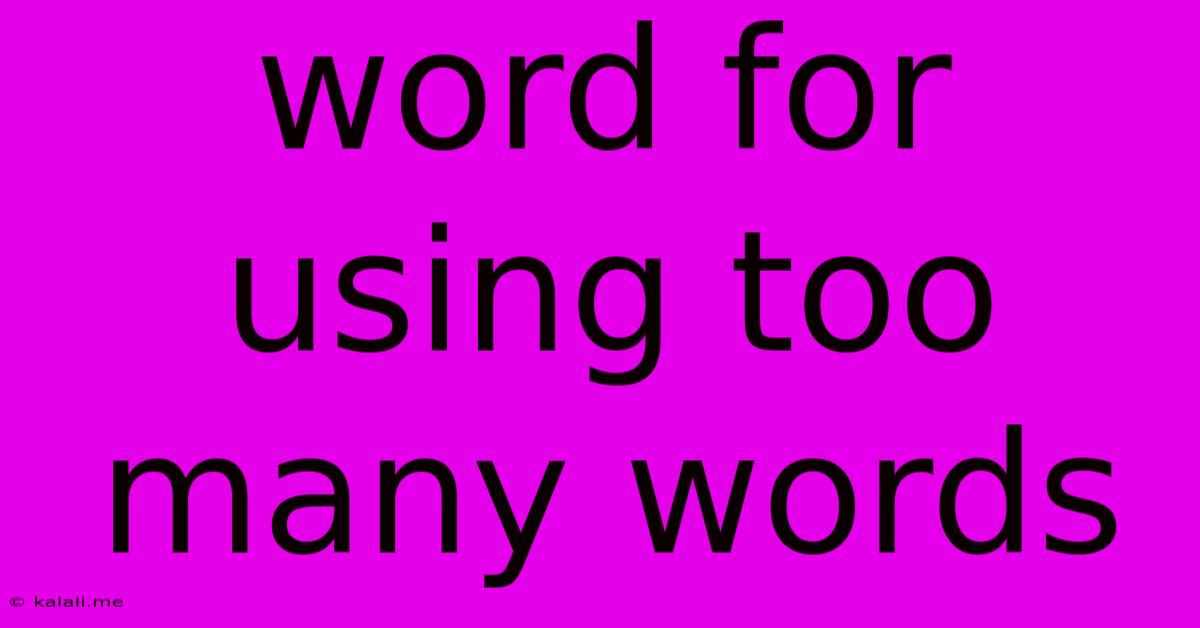Word For Using Too Many Words
Kalali
May 20, 2025 · 3 min read

Table of Contents
The Pernicious Problem of Verbosity: Finding the Right Word for Using Too Many Words
Are you struggling to find the perfect word to describe writing that's excessively long-winded? You're not alone. This article explores the various terms for using too many words, offering nuanced alternatives beyond the common, yet sometimes imprecise, "wordy." We'll delve into the subtle differences between these terms and help you choose the most accurate and impactful descriptor for your writing critique.
Many writers fall prey to the trap of verbosity, often obscuring their message beneath a deluge of unnecessary words. This can lead to reader fatigue, loss of engagement, and ultimately, a failure to communicate effectively. Knowing the right terminology to pinpoint this flaw is crucial for both self-editing and providing constructive feedback.
Synonyms and Nuances: Beyond "Wordy"
While "wordy" is a commonly understood term, it lacks the precision to fully capture the various aspects of excessive verbosity. Let's explore some more nuanced alternatives:
-
Circumlocutory: This elegant word describes speech or writing that is indirect and roundabout, using far more words than necessary to convey a simple point. It suggests a deliberate avoidance of directness. Think of a politician carefully avoiding a direct answer to a question.
-
Prolix: This term implies excessive length and tediousness in writing or speech. It suggests a dull, drawn-out style that lacks conciseness and impact. A prolix essay might ramble on unnecessarily, losing the reader's attention.
-
Verbose: Similar to prolix, but often implies a more ostentatious display of language, possibly using complex vocabulary to impress rather than inform. A verbose writer might employ overly ornate language, sacrificing clarity for style.
-
Redundant: This highlights the repetition of information or ideas. While not always about excessive length, redundancy contributes significantly to wordiness by needlessly repeating points. A sentence containing redundant phrases is unnecessarily long.
-
Long-winded: This is a more colloquial term, conveying a sense of tediousness and drawn-out explanation. It's easily understood and generally effective in informal contexts.
-
Turgid: This strong term suggests a style that is swollen with excessive language, often characterized by pompous or inflated diction. Turgid prose is bloated and difficult to read.
Identifying and Addressing Verbosity in Your Writing
Recognizing verbosity in your own writing requires a critical eye and a willingness to cut unnecessary words. Here are some strategies:
- Read your work aloud: This helps you identify awkward phrasing and overly long sentences.
- Use strong verbs: Strong verbs reduce the need for lengthy adverbial phrases.
- Eliminate clichés and filler words: Phrases like "at this point in time" or "in order to" are often unnecessary.
- Tighten your sentences: Break down long, convoluted sentences into shorter, clearer ones.
- Seek feedback from others: A fresh pair of eyes can often spot wordiness that you've overlooked.
Choosing the right word to describe excessive wordiness depends on the context and the specific nature of the writing flaw. Understanding the subtle differences between these terms empowers you to provide more precise and helpful feedback, whether you're critiquing your own work or offering suggestions to a fellow writer. By mastering the art of concise writing, you can ensure your message is heard clearly and effectively.
Latest Posts
Latest Posts
-
Will A Diesel Car Run On Petrol
May 21, 2025
-
Is It Grammatically Correct To Say
May 21, 2025
-
Nice To Meet U In German
May 21, 2025
-
How To Check If Someone Is Married Uk
May 21, 2025
-
What Is Wet Dreams In Islam
May 21, 2025
Related Post
Thank you for visiting our website which covers about Word For Using Too Many Words . We hope the information provided has been useful to you. Feel free to contact us if you have any questions or need further assistance. See you next time and don't miss to bookmark.